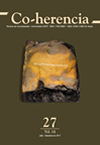Una propuesta de taxonomía para el eliminativismo
Main Article Content
Keywords
Eliminativism, eliminativist argument, eliminativist claim, theo-retical adequacy
Resumen
En este artículo, propongo una taxonomía general de diferentes de formas de eliminativismo. Para alcanzar este propósito, comienzo por explorar el eliminativismo desde una perspectiva amplia, proporcionando un cuadro comparativo de proyectos eliminativistas en dominios distintos. Esta exploración muestra cómo el término ‘eliminativismo’ es utilizado para caracterizar una familia de diversos tipos de argumentos y afirmaciones eliminativistas relacionados. La taxonomía propuesta es un intento de sistematización de dichos argumentos y afirmaciones.
Descargas
Referencias
Baker, L. R. (2007). The Metaphysics of Everyday Life: An Essay in Practical Realism. Cambridge: Cambridge University Press.
Bateson, P. (1991). Are there Principles of Behavioural Development? In P. Bateson (Ed.), The Development and Integration of Behaviour (pp. 19–39). Cambridge: Cambridge University Press.
Churchland, P. M. (1981). Eliminative Materialism and the Propositional Attitudes. Journal of Philosophy, 78 (2), 67–90.
Cowie, F. (2009). Why Isn't Stich an ElimiNativist? In D. Murphy & M. Bishop (Eds.), Stich and His Critics (pp. 14–74). Oxford, England: Blackwell Publishing Ltd.
Elder, C. (2007). On the place of artifacts in ontology. In E. Margolis and S. Laurence (Eds.), Creations of the Mind: Theories of Artifacts and Their Representation (pp. 33–51). Oxford, England: Oxford University Press.
Fodor, J. (1987). Psychosemantics. Cambridge, MA: MIT Press.
French, S. (2014). The Structure of the World. Oxford, England: Oxford University Press.
Gooding-Williams, R. (1998). Race, Multiculturalism and Democracy. Constellations, 5 (1), 18–41.
Griffiths, P. E. (1997). What Emotions Really Are. Chicago, IL: University of Chicago Press.
Griffiths, P. E. (2002). What is Innateness? The Monist, 85(1), 70–85.
Hampton, J. (2010). Concept talk cannot be avoided. Behavioral and Brain Sciences, 33(2–3), 212–213.
Horgan, T. & J. Woodward. (1985). Folk Psychology is Here to Stay. Philosophical Review, 94, 197–225.
Kitcher, P. (1984). In Defense of Intentional Psychology. Journal of Philosophy, 81, 89–106.
Ladyman, J. (2013). Structural Realism. In E. N. Zalta (Ed.), The Stanford Encyclopedia of Philosophy (Winter 2016 Ed.). Retrieved from https://plato.stanford.edu/archives/win2016/entries/structural-realism/
Lahav, R. (1992). The Amazing Predictive Power of Folk Psychology. Australasian Journal of Philosophy, 70, 99–105.
Machery, E. (2009). Doing Without Concepts. New York, NY: Oxford University Press.
Mackie, J. (1977). Ethics: Inventing Right and Wrong. New York, NY: Penguin.
Mallon, R. (2006). Race: Normative, Not Metaphysical or Semantic. Ethics 116(3), 525–551.
Mameli, M. & Bateson, P. (2005). Innateness and the Sciences. Biology and Philosophy, 21(2), 155–88.
Margolis, E. & Laurence, S. (2010). Concepts and theoretical unification. Behavioral and Brain Sciences, 33(2–3), 219–220.
McGrath, M. (2005). No Objects, no Problem? Australasian Journal of Philosophy, 83, 457–486.
Quine, W.V. (2013). Word and Object. Cambridge, MA: MIT Press. (Original work published 1960).
Ramsey, W. (2013). Eliminative Materialism. In E. N. Zalta (Ed.), The Stanford Encyclopedia of Philosophy (Winter 2016 Ed.). Retrieved from http://plato.stanford.edu/archives/sum2013/entries/materialism-eliminative/
Scanlon, T. (2014). Being Realistic About Reasons. Oxford, England: Oxford University Press.
Sesardic, N. (2010). Race: A Social Destruction of a Biological Concept. Biology and Philosophy, 25, 143–162.
Shafer-Landau, R. (2003). Moral Realism: A Defense. Oxford, England: Oxford University Press.
Stich, S. (1983). From Folk Psychology to Cognitive Science. Cambridge MA: MIT Press.
Stich, S. (1996). Deconstructing the Mind. New York, NY: Oxford University Press.
Strohminger, N. & Moore, B. W. (2010). Banishing the thought. Behavioral and Brain Sciences, 33(2–3), 225–226.
Unger, P. (1979). There are no ordinary things. Synthese, 41, 117–54.
Van Inwagen, P. (1990). Material Beings. Ithaca, NY: Cornell University Press.
Worrall, J., (1989). Structural realism: The best of both worlds? Dialectica, 43, 99–124.
Zack, N. (2002). Philosophy of Science and Race. New York, NY: Routledge.




